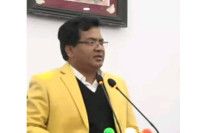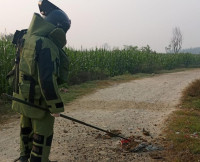National
State coffers to bleed dry as parties compete for populist policies
Globally, social security schemes are meant to ensure that workers do not drop out of the labour market. But Nepal seems to be headed in the opposite direction.
Rupak D. Sharma
Globally, social security schemes are meant to ensure that workers do not drop out of the labour market. But Nepal seems to be headed in the opposite direction.
Take Wednesday’s Cabinet decision to encourage people to retire early, for instance. The meeting called by the caretaker prime minister, whose days in government are numbered, revised the eligibility criterion for elderly allowance. With this change, anyone who is 65 will be entitled to a monthly allowance of Rs2,000. Until now, only people aged 70 and above were entitled to this pay, with the exception of Dalits and people of Karnali region, who qualify for the allowance as they turn 60.
The move comes at a time when discussions are going on to raise the official retirement age from 58 to 60 or above, and when the government is mulling over making many social security programmes contributory so as to reduce the burden on the state.
The latest decision was made apparently without consulting with officials at the Finance Ministry, the body that mobilises resources for public expenditure. This populist decision, made arbitrarily by the Cabinet, will cost the government dear, they said on condition of anonymity.
The problem with populist decisions, such as this one, is that they are rarely rolled back by successive governments, fearing public backlash.
Historically, the CPN-UML used to be at the forefront of making populist decisions that appealed to the masses but bled state coffers dry. This time the move was made by the Nepali Congress, a party that has long opposed the UML’s tactic of pleasing the electorate through inefficient use of taxpayers’ money.
“This is an indication that political parties are competing to introduce populist programmes, which is not good for the country in the long run,” said senior NC leader and former finance minister Ram Sharan Mahat, who is a harsh critic of populist measures. “All the political parties must plan thoroughly before introducing policies, as unnecessary spending, which has actually continued from the past, will dishearten taxpayers.”
Currently, around 900,000 people are receiving the elderly allowance. This means the government is spending around Rs21.6 billion per year to provide stipend to the elderly. Now, with the revision in the age criterion, the government will have to fork out an additional Rs15.3 billion annually if the population estimate of the Central Bureau of Statistics (CBS) is taken into account.
The CBS had projected the number of people aged 65 to 69 to reach 636,431 in 2017. The share of this age group in the total population will continue to grow in the coming days because average life span of Nepalis is increasing.
Life expectancy of Nepalis has jumped to 70 years, according to the latest Human Development Report of the United Nations. This life span is way higher than in 1991—when the average Nepali lived for 54 years—thanks to better healthcare services and diet.
Currently, people aged 65 and above make up around 5.7 percent of the total population. By 2026, people aged 65 and above will account for 6.13 percent of the total population. This figure will rise to 6.68 percent in 2031, according to the CBS. This means the country’s expenditure on elderly allowance will continue to increase in the coming years.
Many agree with the notion that the elderly are the responsibility of the state. “But many in the 65-69 age group are no longer frail and can work and contribute to economic development,” said Yubaraj Khatiwada, former vice-chair of National Planning Commission. “Yet, the government is trying to make them docile. This is an irresponsible act that could derail economic development.”
“The outgoing government’s latest decision to create additional liability for the upcoming government without identifying new [funding] sources to absorb the additional cost is unethical,” said Khatiwada.




 12.21°C Kathmandu
12.21°C Kathmandu















